专题04 定语从句+写作同义词总结(9页)
定语从句知识点总结简单

定语从句知识点总结简单一、定语从句的概念定语从句是指修饰名词或代词的从句,用来限定或描述这个名词或代词的性质、特征等。
定语从句通常放在被修饰的名词或代词之后,用以补充说明名词或代词所指的具体内容。
二、定语从句的结构定语从句的结构包括先行词、关系代词或关系副词以及从句三个部分。
1. 先行词:即被定语从句修饰的名词或代词,通常在定语从句的前面。
2. 关系代词:在定语从句中起连接作用的代词,包括who, whom, whose, which, that等。
3. 关系副词:在定语从句中起连接作用的副词,包括where, when, why等。
三、关系代词和关系副词的用法1. who/whom/whose:关系代词,用来引导修饰人的定语从句。
例如:The girl who is standing there is my sister.The man whose car was stolen has reported to the police.2. which/that:关系代词,用来引导修饰物的定语从句,which一般只用于非限制性定语从句。
例如:The book which is on the table is mine.The pen that I lost last night is found.3. where:关系副词,用来引导修饰地点的定语从句。
例如:This is the school where I study.4. when:关系副词,用来引导修饰时间的定语从句。
例如:That was the day when we met for the first time.5. why:关系副词,用来引导修饰原因的定语从句。
例如:I don't understand the reason why he left so suddenly.以上是关系代词和关系副词的基本用法,需要根据具体的语境来选择适当的关联词。
定语从句相关知识点总结
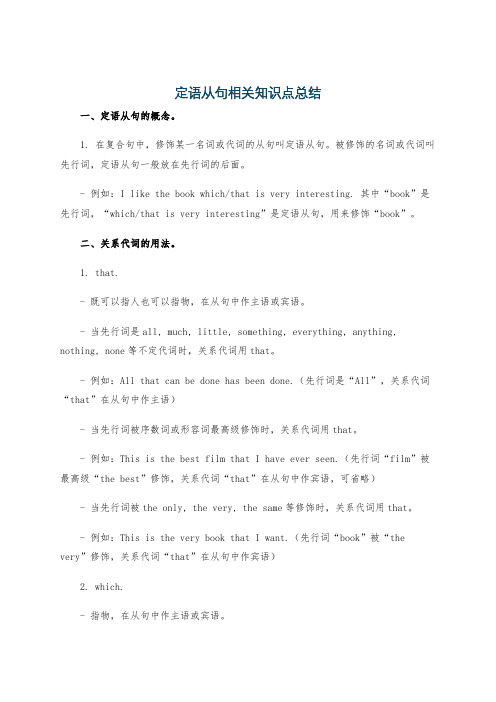
定语从句相关知识点总结一、定语从句的概念。
1. 在复合句中,修饰某一名词或代词的从句叫定语从句。
被修饰的名词或代词叫先行词,定语从句一般放在先行词的后面。
- 例如:I like the book which/that is very interesting. 其中“book”是先行词,“which/that is very interesting”是定语从句,用来修饰“book”。
二、关系代词的用法。
1. that.- 既可以指人也可以指物,在从句中作主语或宾语。
- 当先行词是all, much, little, something, everything, anything, nothing, none等不定代词时,关系代词用that。
- 例如:All that can be done has been done.(先行词是“All”,关系代词“that”在从句中作主语)- 当先行词被序数词或形容词最高级修饰时,关系代词用that。
- 例如:This is the best film that I have ever seen.(先行词“film”被最高级“the best”修饰,关系代词“that”在从句中作宾语,可省略)- 当先行词被the only, the very, the same等修饰时,关系代词用that。
- 例如:This is the very book that I want.(先行词“book”被“the very”修饰,关系代词“that”在从句中作宾语)2. which.- 指物,在从句中作主语或宾语。
- 例如:The book which/that is on the desk is mine.(“which/that”在从句中作主语);I like the book which/that you lent me.(“which/that”在从句中作宾语)- 在非限制性定语从句(从句与主句之间用逗号隔开)中,只能用which,不能用that。
【精品整理】2020年高考英语新题型写作技巧四 定语从句和写作同义词总结

2020年高考英语写作新题型备考技巧专题(四)定语从句+写作同类词合集在写作中运用定语从句不仅可以显示考生较好的语言运用能力,更能为写作增添色彩。
所以考生一定要在平时练习时学会在书信应用文、概写和续写中尝试写定语从句,让作文整体显得漂亮和流畅。
一.用于书面表达中定语从句的类型1.关系代词引导的定语从句who,whom,whose,which,that,as等关系代词引导的定语从句在高考书面表达中屡见不鲜。
尤其以as和which引导的非限制性定语从句更是司空见惯。
①.I’m qualified with every extra work that you want me to do. (2019全国一卷书面表达)②.Last week, we took the foreign students in our school to experience the authentic tea culture,which turned out to be extremely rewarding. (2018北京高考书面表达)③.As is known, I will be a volunteer for the 13th National Games which will be held at the end ofAugust in Tianjin. (2017年天津高考书面表达)④.Any student who is interested is welcome to participate. (2016全国卷书面表达)2.关系副词引导的定语从句when,where,why关系副词引导的定语从句也可以在高考书面表达中找到很多例子。
在写这种类型的定语从句时,一定要注意关系词前面一些特殊的先行词,如:period,age,occasion,situation,case,point,reason等。
①.We are to meet on Sunday morning in the People’s Park, where the air is fresh and the scenery isbeautiful. (2017全国一卷书面表达)②.They found the dangerous situation, where three men circled the wolf. (2017浙江高考书面表达)③.I think the reason why you’re always angry may be the high pressure of study. (2014安徽高考书面表达)3.介词+关系代词引导的定语从句Material collecting took us a whole week, during which we interviewed our teachers and tookpictures of every aspect of our school life.二.定语从句的写法定语从句对于考生来说相对较难灵活运用,所以一定要在平时的写作训练中多加练习。
定语从句语法知识点总结
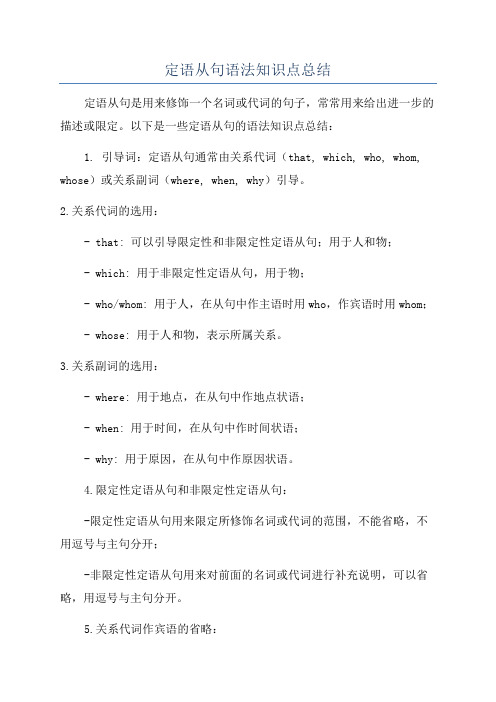
定语从句语法知识点总结定语从句是用来修饰一个名词或代词的句子,常常用来给出进一步的描述或限定。
以下是一些定语从句的语法知识点总结:1. 引导词:定语从句通常由关系代词(that, which, who, whom, whose)或关系副词(where, when, why)引导。
2.关系代词的选用:- that: 可以引导限定性和非限定性定语从句;用于人和物;- which: 用于非限定性定语从句,用于物;- who/whom: 用于人,在从句中作主语时用who,作宾语时用whom;- whose: 用于人和物,表示所属关系。
3.关系副词的选用:- where: 用于地点,在从句中作地点状语;- when: 用于时间,在从句中作时间状语;- why: 用于原因,在从句中作原因状语。
4.限定性定语从句和非限定性定语从句:-限定性定语从句用来限定所修饰名词或代词的范围,不能省略,不用逗号与主句分开;-非限定性定语从句用来对前面的名词或代词进行补充说明,可以省略,用逗号与主句分开。
5.关系代词作宾语的省略:- 当关系代词在定语从句中作宾语时,可以省略:即省略关系代词that/which/who/whom,但要保留动词的宾语位置。
6.关系代词和关系副词在定语从句中的不同作用:-关系代词在定语从句中充当一个成分,可以作主语、宾语、表语等;-关系副词在定语从句中充当一个状语,只能作时间、地点或原因状语。
7.先行词和定语从句的一致性:-关系代词的单复数和人称应与其在定语从句中的先行词保持一致;- 关系代词whose引导的定语从句是表示所属关系的,后面的先行词是被关系代词修饰的名词。
需要注意的是,定语从句的位置可以是句首、句中或句尾,要根据具体情况进行调整。
定语从句总结
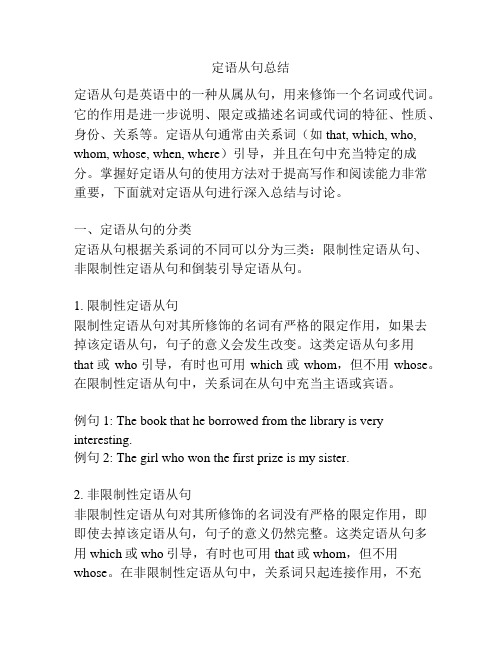
定语从句总结定语从句是英语中的一种从属从句,用来修饰一个名词或代词。
它的作用是进一步说明、限定或描述名词或代词的特征、性质、身份、关系等。
定语从句通常由关系词(如that, which, who, whom, whose, when, where)引导,并且在句中充当特定的成分。
掌握好定语从句的使用方法对于提高写作和阅读能力非常重要,下面就对定语从句进行深入总结与讨论。
一、定语从句的分类定语从句根据关系词的不同可以分为三类:限制性定语从句、非限制性定语从句和倒装引导定语从句。
1. 限制性定语从句限制性定语从句对其所修饰的名词有严格的限定作用,如果去掉该定语从句,句子的意义会发生改变。
这类定语从句多用that或who引导,有时也可用which或whom,但不用whose。
在限制性定语从句中,关系词在从句中充当主语或宾语。
例句1: The book that he borrowed from the library is very interesting.例句2: The girl who won the first prize is my sister.2. 非限制性定语从句非限制性定语从句对其所修饰的名词没有严格的限定作用,即即使去掉该定语从句,句子的意义仍然完整。
这类定语从句多用which或who引导,有时也可用that或whom,但不用whose。
在非限制性定语从句中,关系词只起连接作用,不充当从句中的任何成分。
例句1: The weather, which was very hot, made us feel uncomfortable.例句2: John, who is my best friend, is coming to visit me tomorrow.3. 倒装引导定语从句在特殊句型中,如果定语从句的主语是由it, which或who引导的,且根据句意需要发生倒装时,通常用倒装引导定语从句。
专四常用同义词辨析

专四常用同义词辨析专四同义词辨析专四词汇考察中会经常出现一些易混淆的同义词,为大家分享一下本人整理的易混同义词辨析,本帖会持续为大家更新,总结出来的同义词考察频率是相当高,建议大家重视一下以下词汇。
本期为大家总结的是use, apply, avail, employ, utilize这些词汇的这组词均含有“使用”或“利用”之意。
use强调利用人或物作为工具。
He used up all his resources in experimenting with the new paint.他为实验新的涂料,花光了一切钱财。
apply指把某物或某种方法、原理等加以应用。
We should not only know the theory but also know how to apply it to practice.我们不仅要知道理论,还要知道怎样把理论应用于实践。
avail指使用就近的或他人给予的东西,或使别人为自己提供服务。
I don't think complaints will avail you much.我觉得抱怨对你没多大用处。
We avail ourselves of every opportunity to speak English.我们利用一切机会讲英语。
employ指使用未被利用的东西;用于人时表示雇用。
He doesn't know how to employ his energy and time.他不知道该怎么利用他的精力和时间。
utilize指充分发挥某物的作用,使无用的东西变有用,或使人或物有新用途。
She hopes to utilize her artistic talents in the job.她希望在工作中发挥她的艺术才能。
继续为大家更新专四高频同义词辨析内容,今天为大家更新的是begin, commence, initiate, launch, start词汇的辨析。
定语从句知识点归纳
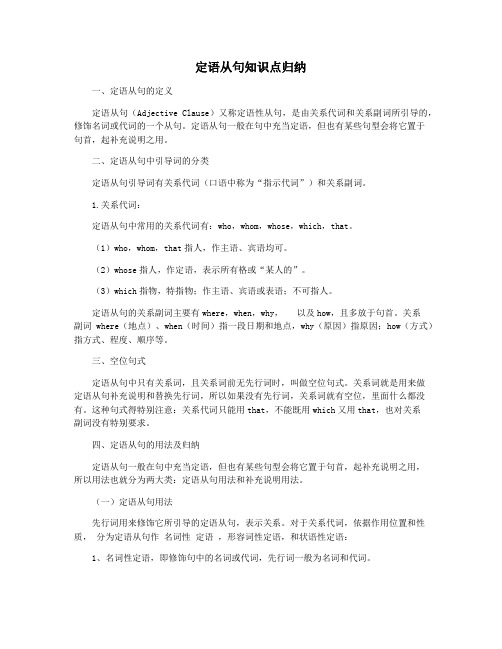
定语从句知识点归纳一、定语从句的定义定语从句(Adjective Clause)又称定语性从句,是由关系代词和关系副词所引导的,修饰名词或代词的一个从句。
定语从句一般在句中充当定语,但也有某些句型会将它置于句首,起补充说明之用。
二、定语从句中引导词的分类定语从句引导词有关系代词(口语中称为“指示代词”)和关系副词。
1.关系代词:定语从句中常用的关系代词有:who,whom,whose,which,that。
(1)who,whom,that指人,作主语、宾语均可。
(2)whose指人,作定语,表示所有格或“某人的”。
(3)which指物,特指物;作主语、宾语或表语;不可指人。
定语从句的关系副词主要有where,when,why,以及how,且多放于句首。
关系副词where(地点)、when(时间)指一段日期和地点,why(原因)指原因;how(方式)指方式、程度、顺序等。
三、空位句式定语从句中只有关系词,且关系词前无先行词时,叫做空位句式。
关系词就是用来做定语从句补充说明和替换先行词,所以如果没有先行词,关系词就有空位,里面什么都没有。
这种句式得特别注意:关系代词只能用that,不能既用which又用that,也对关系副词没有特别要求。
四、定语从句的用法及归纳定语从句一般在句中充当定语,但也有某些句型会将它置于句首,起补充说明之用,所以用法也就分为两大类:定语从句用法和补充说明用法。
(一)定语从句用法先行词用来修饰它所引导的定语从句,表示关系。
对于关系代词,依据作用位置和性质,分为定语从句作名词性定语,形容词性定语,和状语性定语:1、名词性定语,即修饰句中的名词或代词,先行词一般为名词和代词。
3、状语性定语,先行词一般为动词、形容词、副词,表示“时间、原因、地点、方式、条件、目的等状语”,关系代词一般是when, where, why, how等。
(二)补充说明用法定语从句也可用作补充说明,其用法也分两种:1、空位句式作补充说明,即在句首加入关系代词或副词,将定语从句放在句首,表示补充说明,而不定语性。
定语从句知识点总结
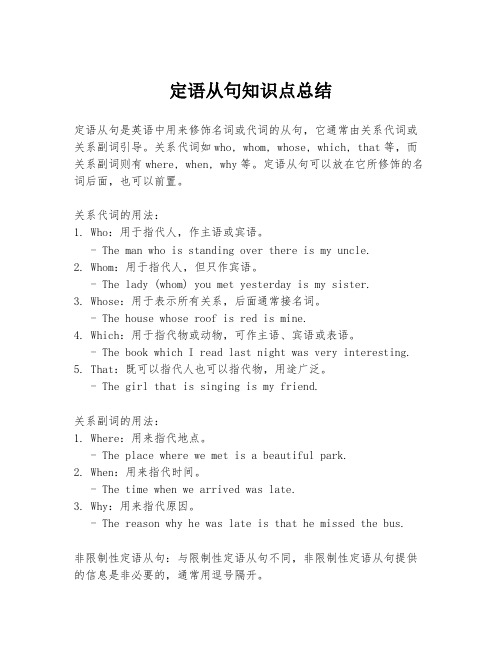
定语从句知识点总结定语从句是英语中用来修饰名词或代词的从句,它通常由关系代词或关系副词引导。
关系代词如who, whom, whose, which, that等,而关系副词则有where, when, why等。
定语从句可以放在它所修饰的名词后面,也可以前置。
关系代词的用法:1. Who:用于指代人,作主语或宾语。
- The man who is standing over there is my uncle.2. Whom:用于指代人,但只作宾语。
- The lady (whom) you met yesterday is my sister.3. Whose:用于表示所有关系,后面通常接名词。
- The house whose roof is red is mine.4. Which:用于指代物或动物,可作主语、宾语或表语。
- The book which I read last night was very interesting.5. That:既可以指代人也可以指代物,用途广泛。
- The girl that is singing is my friend.关系副词的用法:1. Where:用来指代地点。
- The place where we met is a beautiful park.2. When:用来指代时间。
- The time when we arrived was late.3. Why:用来指代原因。
- The reason why he was late is that he missed the bus.非限制性定语从句:与限制性定语从句不同,非限制性定语从句提供的信息是非必要的,通常用逗号隔开。
- My brother, who is a doctor, lives in Canada.限制性定语从句:提供必要的信息,没有逗号。
- The book that I bought yesterday is very interesting.注意点:- 定语从句中的关系代词或副词在从句中必须充当成分,如主语、宾语或状语。
定语从句知识点总结
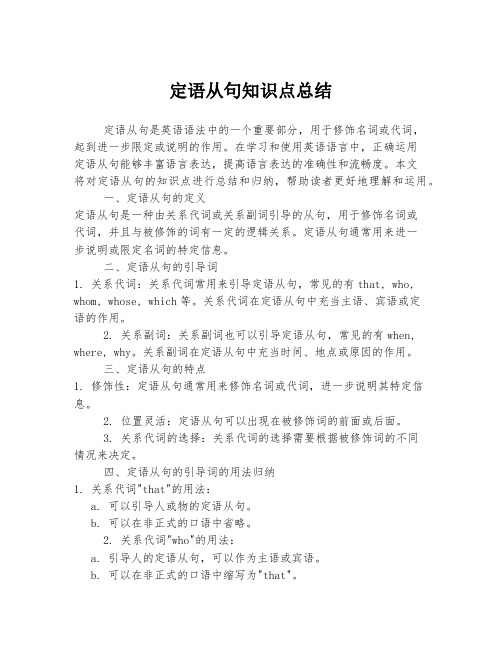
定语从句知识点总结定语从句是英语语法中的一个重要部分,用于修饰名词或代词,起到进一步限定或说明的作用。
在学习和使用英语语言中,正确运用定语从句能够丰富语言表达,提高语言表达的准确性和流畅度。
本文将对定语从句的知识点进行总结和归纳,帮助读者更好地理解和运用。
一、定语从句的定义定语从句是一种由关系代词或关系副词引导的从句,用于修饰名词或代词,并且与被修饰的词有一定的逻辑关系。
定语从句通常用来进一步说明或限定名词的特定信息。
二、定语从句的引导词1. 关系代词:关系代词常用来引导定语从句,常见的有that, who, whom, whose, which等。
关系代词在定语从句中充当主语、宾语或定语的作用。
2. 关系副词:关系副词也可以引导定语从句,常见的有when, where, why。
关系副词在定语从句中充当时间、地点或原因的作用。
三、定语从句的特点1. 修饰性:定语从句通常用来修饰名词或代词,进一步说明其特定信息。
2. 位置灵活:定语从句可以出现在被修饰词的前面或后面。
3. 关系代词的选择:关系代词的选择需要根据被修饰词的不同情况来决定。
四、定语从句的引导词的用法归纳1. 关系代词"that"的用法:a. 可以引导人或物的定语从句。
b. 可以在非正式的口语中省略。
2. 关系代词"who"的用法:a. 引导人的定语从句,可以作为主语或宾语。
b. 可以在非正式的口语中缩写为"that"。
3. 关系代词"which"的用法:a. 引导事物的定语从句,可以作为主语或宾语。
4. 关系代词"whom"的用法:a. 用来引导人的定语从句,在正式的写作中常用,可以作为宾语。
5. 关系代词"whose"的用法:a. 用来引导人或物的定语从句,表示所属关系。
6. 关系副词"when"的用法:a. 引导时间的定语从句。
定语从句知识总结(最新9篇)
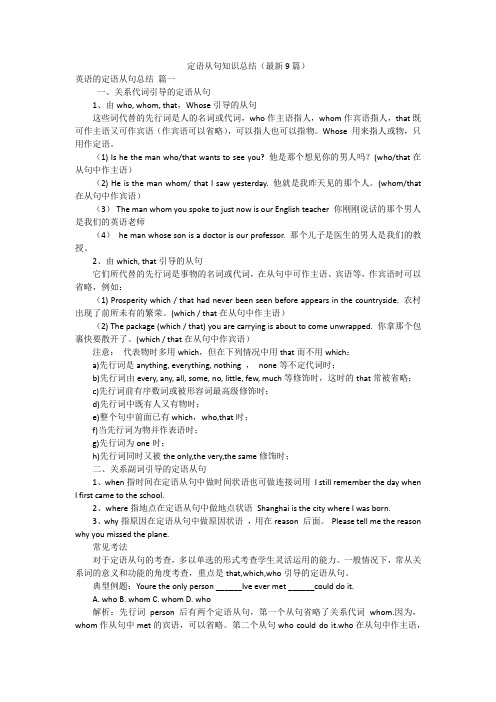
定语从句知识总结(最新9篇)英语的定语从句总结篇一一、关系代词引导的定语从句1、由who, whom, that,Whose引导的从句这些词代替的先行词是人的名词或代词,who作主语指人,whom作宾语指人,that既可作主语又可作宾语(作宾语可以省略),可以指人也可以指物。
Whose 用来指人或物,只用作定语。
(1) Is he the man who/that wants to see you? 他是那个想见你的男人吗?(who/that在从句中作主语)(2) He is the man whom/ that I saw yesterday. 他就是我昨天见的那个人。
(whom/that 在从句中作宾语)(3)The man whom you spoke to just now is our English teacher 你刚刚说话的那个男人是我们的英语老师(4)he man whose son is a doctor is our professor. 那个儿子是医生的男人是我们的教授。
2、由which, that引导的从句它们所代替的先行词是事物的名词或代词,在从句中可作主语、宾语等,作宾语时可以省略,例如:(1) Prosperity which / that had never been seen before appears in the countryside. 农村出现了前所未有的繁荣。
(which / that在从句中作主语)(2) The package (which / that) you are carrying is about to come unwrapped. 你拿那个包裹快要散开了。
(which / that在从句中作宾语)注意:代表物时多用which,但在下列情况中用that而不用which:a)先行词是anything, everything, nothing ,none等不定代词时;b)先行词由every, any, all, some, no, little, few, much等修饰时,这时的that常被省略;c)先行词前有序数词或被形容词最高级修饰时;d)先行词中既有人又有物时;e)整个句中前面已有which,who,that时;f)当先行词为物并作表语时;g)先行词为one时;h)先行词同时又被the only,the very,the same修饰时;二、关系副词引导的定语从句1、when指时间在定语从句中做时间状语也可做连接词用I still remember the day whenI first came to the school.2、where指地点在定语从句中做地点状语Shanghai is the city where I was born.3、why指原因在定语从句中做原因状语,用在reason 后面。
定语从句语法知识点总结
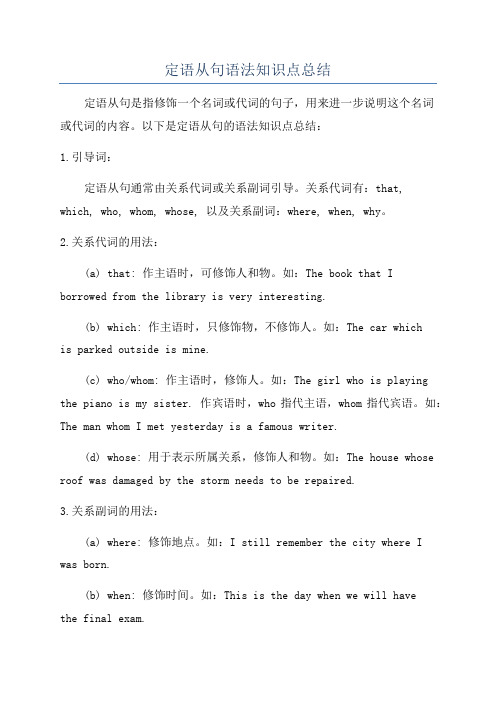
定语从句语法知识点总结定语从句是指修饰一个名词或代词的句子,用来进一步说明这个名词或代词的内容。
以下是定语从句的语法知识点总结:1.引导词:定语从句通常由关系代词或关系副词引导。
关系代词有:that, which, who, whom, whose, 以及关系副词:where, when, why。
2.关系代词的用法:(a) that: 作主语时,可修饰人和物。
如:The book that I borrowed from the library is very interesting.(b) which: 作主语时,只修饰物,不修饰人。
如:The car whichis parked outside is mine.(c) who/whom: 作主语时,修饰人。
如:The girl who is playing the piano is my sister. 作宾语时,who指代主语,whom指代宾语。
如:The man whom I met yesterday is a famous writer.(d) whose: 用于表示所属关系,修饰人和物。
如:The house whose roof was damaged by the storm needs to be repaired.3.关系副词的用法:(a) where: 修饰地点。
如:I still remember the city where I was born.(b) when: 修饰时间。
如:This is the day when we will havethe final exam.(c) why: 修饰原因。
如:I don't understand the reason why he quit his job.4.关系代词在从句中的成分:关系代词在定语从句中可以充当主语、宾语、介词的宾语或者表语。
如:The girl (who/whom/that) I met at the party is my cousin. (关系代词充当宾语)5.关系词的省略:当关系代词在定语从句中作宾语时,且在从句中不作其他成分时,可以将关系代词省略。
定语从句知识点总结
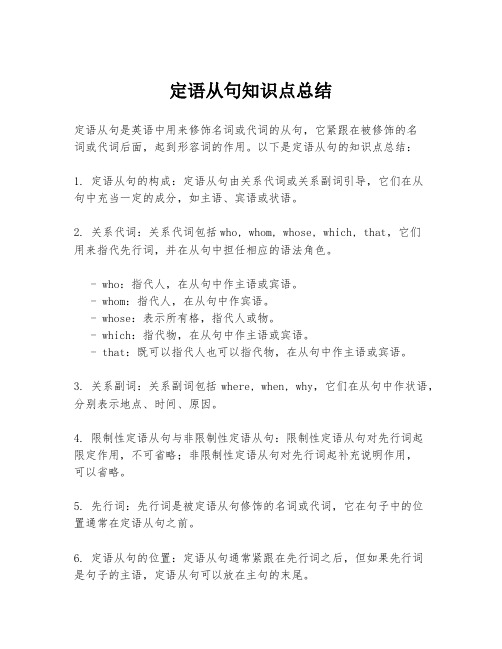
定语从句知识点总结定语从句是英语中用来修饰名词或代词的从句,它紧跟在被修饰的名词或代词后面,起到形容词的作用。
以下是定语从句的知识点总结:1. 定语从句的构成:定语从句由关系代词或关系副词引导,它们在从句中充当一定的成分,如主语、宾语或状语。
2. 关系代词:关系代词包括who, whom, whose, which, that,它们用来指代先行词,并在从句中担任相应的语法角色。
- who:指代人,在从句中作主语或宾语。
- whom:指代人,在从句中作宾语。
- whose:表示所有格,指代人或物。
- which:指代物,在从句中作主语或宾语。
- that:既可以指代人也可以指代物,在从句中作主语或宾语。
3. 关系副词:关系副词包括where, when, why,它们在从句中作状语,分别表示地点、时间、原因。
4. 限制性定语从句与非限制性定语从句:限制性定语从句对先行词起限定作用,不可省略;非限制性定语从句对先行词起补充说明作用,可以省略。
5. 先行词:先行词是被定语从句修饰的名词或代词,它在句子中的位置通常在定语从句之前。
6. 定语从句的位置:定语从句通常紧跟在先行词之后,但如果先行词是句子的主语,定语从句可以放在主句的末尾。
7. 定语从句的时态:定语从句的时态通常与主句的时态保持一致,但也可以根据不同的语境进行调整。
8. 定语从句的省略:在某些情况下,定语从句中的某些成分可以省略,尤其是当关系代词在从句中作宾语时。
9. 定语从句的分隔:有时,为了强调或避免混淆,定语从句可以被分隔开来,即先行词和定语从句之间插入其他成分。
10. 定语从句的复杂结构:在复杂句中,定语从句可以嵌套使用,即一个定语从句内部还可以包含另一个定语从句。
掌握定语从句的这些知识点,可以帮助我们更准确地理解和使用英语中的定语从句,从而提高英语表达的准确性和丰富性。
定语从句知识点归纳总结

一、定语从句的概念在复合句中,修饰某一名词或代词的从句叫做定语从句。
被定语从句修饰的名词或代词叫先行词,定语从句一般放在先行词的后面。
二、定语从句的关系词引导定语从句的关系词有关系代词和关系副词。
关系代词有 that, which, who, whom, whose 等;关系副词有 when, where, why 等。
1. 关系代词的用法that 既可以指人也可以指物,在定语从句中作主语、宾语或表语。
which 指物,在定语从句中作主语、宾语。
who 指人,在定语从句中作主语、宾语。
whom 指人,在定语从句中作宾语。
whose 既可以指人也可以指物,在定语从句中作定语。
2. 关系副词的用法when 指时间,在定语从句中作时间状语。
where 指地点,在定语从句中作地点状语。
why 指原因,在定语从句中作原因状语。
三、定语从句的分类1. 限制性定语从句限制性定语从句对先行词起限制、修饰的作用,关系紧密,一般不可缺少,否则主句的意思就不完整。
2. 非限制性定语从句非限制性定语从句对先行词起补充说明的作用,关系较松散,即使去掉,主句的意思仍然完整。
非限制性定语从句与主句之间通常用逗号隔开。
四、定语从句中关系词的选择1. 先行词是人时,关系词用 who/whom/that当先行词在从句中作主语时,用 who/that。
当先行词在从句中作宾语时,用 whom/who/that(在口语或非正式文体中常用 who 代替 whom)。
2. 先行词是物时,关系词用 which/that当先行词在从句中作主语或宾语时,用 which/that。
3. 先行词是人和物时,关系词用 that4. 先行词是时间名词时,关系词用 when当先行词在从句中作时间状语时,用 when。
5. 先行词是地点名词时,关系词用 where当先行词在从句中作地点状语时,用 where。
6. 先行词是 reason 时,关系词用 why当先行词在从句中作原因状语时,用 why。
九年级定语从句知识点笔记
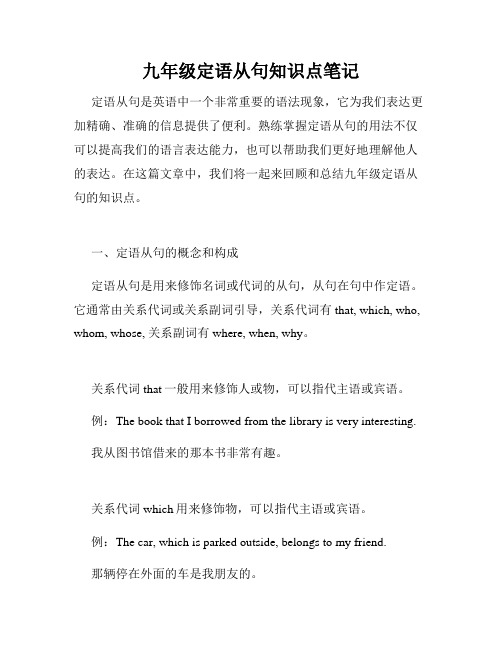
九年级定语从句知识点笔记定语从句是英语中一个非常重要的语法现象,它为我们表达更加精确、准确的信息提供了便利。
熟练掌握定语从句的用法不仅可以提高我们的语言表达能力,也可以帮助我们更好地理解他人的表达。
在这篇文章中,我们将一起来回顾和总结九年级定语从句的知识点。
一、定语从句的概念和构成定语从句是用来修饰名词或代词的从句,从句在句中作定语。
它通常由关系代词或关系副词引导,关系代词有that, which, who, whom, whose, 关系副词有where, when, why。
关系代词that一般用来修饰人或物,可以指代主语或宾语。
例:The book that I borrowed from the library is very interesting.我从图书馆借来的那本书非常有趣。
关系代词which用来修饰物,可以指代主语或宾语。
例:The car, which is parked outside, belongs to my friend.那辆停在外面的车是我朋友的。
关系代词who和whom用来修饰人,who在从句中做主语,whom在从句中做宾语。
例:The girl who is standing there is my sister.那个站在那里的女孩是我妹妹。
The teacher whom we met yesterday is very kind.我们昨天见到的那位老师非常和善。
关系代词whose用来修饰人或物,表示所属关系。
例:The man whose car was stolen reported it to the police.那个车被偷的人向警察报了案。
关系副词where用来修饰地点,在从句中作状语。
例:I still remember the city where I was born.我依然记得我出生的那个城市。
关系副词when用来修饰时间,在从句中作状语。
2023最新-定语从句知识总结(最新5篇)
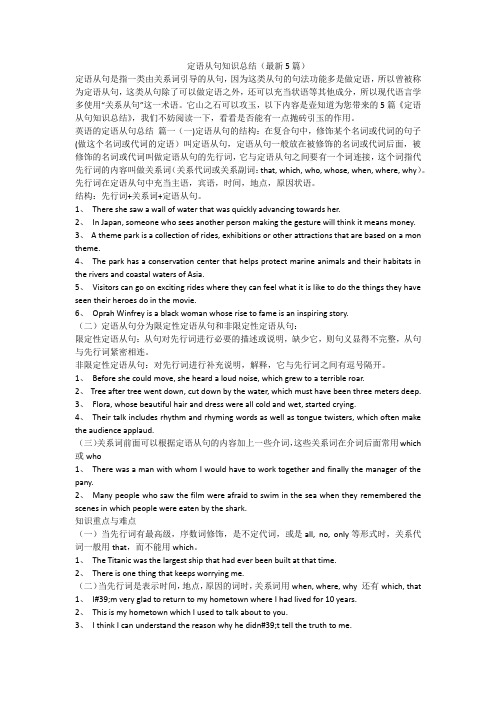
定语从句知识总结(最新5篇)定语从句是指一类由关系词引导的从句,因为这类从句的句法功能多是做定语,所以曾被称为定语从句,这类从句除了可以做定语之外,还可以充当状语等其他成分,所以现代语言学多使用“关系从句”这一术语。
它山之石可以攻玉,以下内容是壶知道为您带来的5篇《定语从句知识总结》,我们不妨阅读一下,看看是否能有一点抛砖引玉的作用。
英语的定语从句总结篇一(一)定语从句的结构:在复合句中,修饰某个名词或代词的句子(做这个名词或代词的定语)叫定语从句,定语从句一般放在被修饰的名词或代词后面,被修饰的名词或代词叫做定语从句的先行词,它与定语从句之间要有一个词连接,这个词指代先行词的内容叫做关系词(关系代词或关系副词:that, which, who, whose, when, where, why)。
先行词在定语从句中充当主语,宾语,时间,地点,原因状语。
结构:先行词+关系词+定语从句。
1、There she saw a wall of water that was quickly advancing towards her.2、In Japan, someone who sees another person making the gesture will think it means money.3、A theme park is a collection of rides, exhibitions or other attractions that are based on a mon theme.4、The park has a conservation center that helps protect marine animals and their habitats in the rivers and coastal waters of Asia.5、Visitors can go on exciting rides where they can feel what it is like to do the things they have seen their heroes do in the movie.6、Oprah Winfrey is a black woman whose rise to fame is an inspiring story.(二)定语从句分为限定性定语从句和非限定性定语从句:限定性定语从句:从句对先行词进行必要的描述或说明,缺少它,则句义显得不完整,从句与先行词紧密相连。
专四常考形近异义词
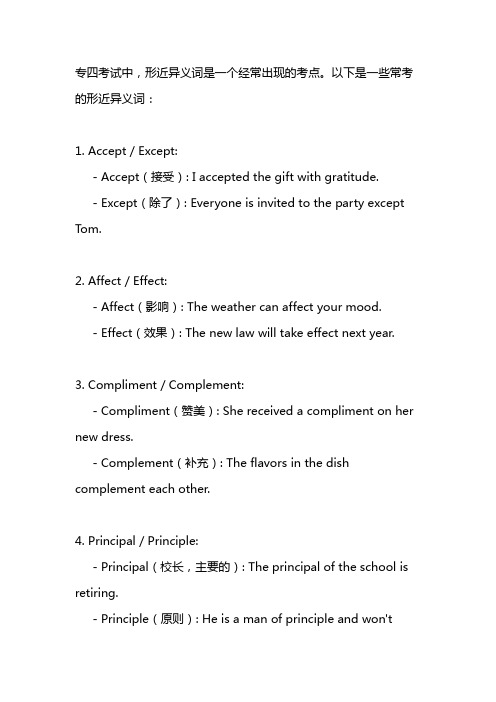
专四考试中,形近异义词是一个经常出现的考点。
以下是一些常考的形近异义词:1. Accept / Except:- Accept(接受): I accepted the gift with gratitude.- Except(除了): Everyone is invited to the party except Tom.2. Affect / Effect:- Affect(影响): The weather can affect your mood.- Effect(效果): The new law will take effect next year.3. Compliment / Complement:- Compliment(赞美): She received a compliment on her new dress.- Complement(补充): The flavors in the dish complement each other.4. Principal / Principle:- Principal(校长,主要的): The principal of the school is retiring.- Principle(原则): He is a man of principle and won'tcompromise his beliefs.5. Their / There / They're:- Their(他们的): They brought their own snacks.- There(那里): The bookstore is over there.- They're(他们是): They're coming to the party tonight.6. Passed / Past:- Passed(过去式): He passed the exam with flying colors.- Past(过去): Let's not dwell on the past.7. Quiet / Quite:- Quiet(安静的): Please be quiet in the library.- Quite(相当,完全): The movie was quite enjoyable.8. Principle / Principal:- Principle(原则): She adheres to a strict set of principles.- Principal(校长,主要的): The principal reason for the delay was traffic.9. Advice / Advise:- Advice(建议,意见): Can you give me some advice onmy presentation?- Advise(建议,劝告): I advise you to study regularly for the exam.10. Bear / Bare:- Bear(忍受): He can't bear the cold weather.- Bare(赤裸的): The tree branches were bare in winter.熟练掌握这些形近异义词的用法,有助于在专四考试中避免常见的错误。
英语写作同义词及高频句型

知识/经验丰富:be rich in knowledge/experience确立/追求目标:set/pursue a goal/higher standard到达目标:achieve/accomplish/stain the goal/aim/objective克服困难:overcome obstacles/difficulty面临危险/困难:be confronted/faced with/in the face of danger/difficulty阻碍了成功:stand in the way of success, be an obstacle/barrier to success/growth 阻碍了发展:hamper/impede/stunt the development of持传统的看法:hold conventional wisdom发表看法:voice/express one's opinion持相反/合理的观点:take the opposite/fresh view揭穿某种一贯的说法:shatter the myth of求得帮助:enlist one's support/help缩小差别:bridge/narrow/fill the gap/gulf (between city and country)把成功/错误归咎于:attribute/own the success/failure to对……重要:be indispensable/important/vital to施加压力:put/exert an academic pressure on重视:assign/attach much importance/significance to强调:place/put much emphasis/stress/value on把注意力集中在:focus/concentrate one's attention/efforts/thoughts upon提供机会/信息:provide/offer/furnish an opportunity/information for sb.抓住机会:grab/seize/take the opportunity得到机会:enjoy/gain access to a opportunity/information有可能:there is (little/much) possibility/likelihood that, chances/the odds are that 展开竞争:compete against/with sb. for the prize/position/control/the mastery of开展运动:conduct (carry on/undertake/initiate/launch/wage) a(vigorous/nation-wide/publicity/advertising) campaign (for/against)对我很有/没有什么意义:make much/little sense to me带来无穷的幸福/满足:be a source of happiness/ satisfaction/contentment/pride献身于:devote/dedicate/commit oneself to a cause/career大不(没什么)两样:make much(little/no) difference真正重要的是:what reall y matters/accounts is …改变生活旅程:change/alter the course of life建立在大量的学习/实践上:built on tremendous amount of study/practice进行调查/执行任务:conduct/carry out an study/task/experiment辞去工作/学习:leave/quit one's job/work/school参加考试/竞赛等:enter/take the examination/contest, race参加活动/讨论:take part/participate/be engaged in sports/activities/discussion影响思想/态度/事件的形成:shape one's thinking/attitude进入大学/社会/家庭/职业:enter a school/college/society /professionals实现自己的理想/愿望:realize/fulfill/achieve one's dream (hope/wish/desire)减轻压力/紧张:reduce/alleviate/relieve the stress/pressure/tension/strain提高社会地位:enhance/improve/upgrade social status/position提高技术/能力:sharpen (increase/improve/enhance/boost) one's skill/ability加快/促进发展:accelerate/facilitate/advance/enhance/boost the development of随着生活节奏的加快:with the quickening pace/rhythm/tempo of modern life/society开阔眼界/兴趣:broaden one's interest/outlook, expand (broaden/enlarge) one's mental horizons 有助于了解/发展/宣传/解决:contribute much/little/greatly/to a better understanding of/the popularity of/the growth of/the solution of有助于解决问题:go a long way to (towards) solving the problem迷恋名利/分数:be obsessed/preoccupied with grades/fame/fortune把时间花/浪费在:spend/waste time doing sth., put in hours doing sth.利用机会/技术:make (full/better) use of/take advantage of opportunity/time, tap/harness technology potential/skills/talent把知识/经验运用到…:apply/put the theory/knowledge/experience… to practice/daily life/good use取得进步:make much progress/strides/gains in充分发挥潜力/能力:develop one's ability/potential to the full, give full play to one's ability充满激情/渴望:have a burning desire/a great passion for连词篇Firstly: previously, beforehand, foremost, initially, originally, formerly, principally, mainly, essentially, basically, generally, commonly, universally, on the whole, fundamentally,to begin with, to start with, first of all, at the outset…Then: subsequently, afterward, thereafter, after that, secondarily, what ismore, furthermore (further more)…Lastly: ultimately, eventually, in conclusion, to conclude, as a final point, last of all, last but not least, finally…Too: as well (句末)也, in addition, besides, moreover, additionally, to boot, excessively, also…And: plus,as well as, along with, in addition, bonus, with…Or: otherwise, if not, before, or else…So (adv): therefore, thus, consequently, accordingly, as a result, for that reason, hence, that’s whyBecause: as, due to, since, as to, in that, for the reason that, for, now that…But:however, moreover, nevertheless, nonetheless, on the contrary, on the other hand, 让步although, even thought, though, even if, while, as, despite the fact that…Only: just, merely, barely, singly, solely, rarely…Without: excluding,Very: extremely, acutely, decidedly, deeply, exceedingly, greatly, highly, uncommonly, profoundly, unusually…Actually: as a matter of fact, indeed, in fact, in point of fact, in reality, in truth, literally, truly …形容词/副词Important: essential, significant, vital, crucial, profound, play a pushing role, indispensable, requisite, critical, fundamental, primary, elementary, underlying, rudimentary, basically, necessary…-附加-傻句替换:I think that A is more important than B. (以下句中的'important'可随意替换同义词)1. A is important to B.2. A plays an/a important role to B.3. A is of (great\enormous\significant\awesome) to B.4. B can not (live\developed\grow\survive\achieve) without A.5. A means (a lot\a great deal\much) to B.6. The importance of A (to B) can never be (exaggerated\denied\ignored\doubted).7. A is everything/the whole world to B.8. B is fundamental on A.9. A matters/counts to B.10. Nothing is more crucial to B than A.11. A is to B what the (foundation is to a skyscraper\water is to fish\the heart is to a human) Big: gigantic, massive, colossal, enormous, immense, gargantuan, tremendous, titanic, giant, vast, large, huge, monster, bulky,->many: numerous, myriad, infinite,->forever (adv): infinity, eternal, timeless, everlasting,undying, endless, changeless, perpetually…Small: minimum, diminutive, minute, petite, wee, undersized, teeny, tiny, little, petite(女子身高娇小)Good: marvelous, fabulous, gorgeous, spectacular, outstanding, distinguished, remarkable, superb, incredible, unbelievable, out of this world, magnificent, charming, stunning, fantastic, terrific, excellent, great, wonderful, amazing, awesomeBad: awful, terrible, dreadful, defective, faulty, imperfect, inadequate, poor, substandard, unsatisfactory, harmful, damaging, deleterious, detrimental, hurtful, ruinous, unhealthy, evil, immoral…Clever: brilliant, knowledgeable, intellectual, intelligent, excellent, bright, smartHappy: delightful, delectable, elated, glad, overjoyed, pleased, jubilant, merry, joyful, Beautiful: charming, charismatic, attractive, gorgeous, pretty, endearing, sweet, adorable, eye-catching, handsome, hot, cute, good-looking, lovable, engaging…Fast:swift, quick, rapid, speedy, hasty, nippy, like lightning,hurry (v): hustle, rush, make haste, tear, step on it, dash, get a move on, step on it, scoot.Easy: simple, effortless, no trouble, painless, plain sailing, uncomplicated, undemanding, unproblematic, a piece of cake (informal), child’s play (informal),…Clear: obvious, apparent, blatant, comprehensible, conspicuous, distinct, evident, manifest, palpable, plain, pronounced, recognizable, transparent, intelligible, lucid, plain, understandable, uninvolved, simple, …Direct: bald, basic, frank, naked, plain, sincere, stark, straightforward, candid, forthright, outspoken….Difficult: hard, tricky, complicated, complex, intricate, involved, knotty, perplexing, puzzling, thorny…Angry: annoyed, cross, displeased, enraged, exasperated, incensed, infuriated, irate, mad (informal), livid (informal), berserk, outraged, resentful...Dangerous: perilous, breakneck, chancy (informal), hazardous, insecure, precarious, risky, unsafe, vulnerable动词Think (that): hold the (opinion/ belief/ position/stand point/idea) that, assume, believe, deem, reckon, argue, maintain, suppose, conceive, insist, be convinced, to my knowledge, personally, from my personal perspective, as far as I am concerned, from my point of view, from my angle, consider, conceive, perspective...Show: convey, reveal, express, corroborate, justify, imply, verify, clarify, signify, exemplify, illuminate, substantiate, demonstrate, elucidate, denote, characterized as, instruct, display, disclose, indicate, means, explain, give an/a example (reason, explanation) of, bear out, point out, point toward…Know: realize, comprehend, identify, distinguish, discern, notice, perceive, recognize, see, understand, figure out, be acquainted with, be familiar with,Get: acquire, attain, acquire, achieve, obtain, gain, learnSuggest: have a proposal in,Increase: magnify, expand, proliferate, mushroom, improve, enhance, advance…Impress: affect, inspire, engrave on, imprint of,Influence: impact, affect, guide, sway,Stop: halt, cease, conclude, desist, end, pause, put an end to, quit, refrain, shut down, terminate…Mak e: create, assemble, built, construct, form, manufacture; fore, cause, compel, constrain, drive, impel, induce, oblige, prevail, upon, require…Give: present, award, contribute, deliver, donate, grant, hand over, hand out, provide, supply Break:separate, burst, crack, destroy, disintegrate, fracture, fragment, shatter, smash, snap Destroy: ruin, raze, annihilate, crush, demolish, devastate, eradicate, shatter, wipe out, wreck, obliterate, weaken, undermine…Happen: occur, come about, come to pass, develop, result, take place, transpire名词Problem: issue, question, case, trouble, difficulty, dilemma.Meeting: conference, discussion, assembly, conclave, congress, convention, gathering session, assignation, encounter, confrontation, argument, controversy…Study: learning, application, lessons, reading, research, school work, examination, analysis, consideration, contemplation, inspection, i nvestigation, knowledge,scholarship…Advantage: benefit, dominance, precedence, profit, superiority, merit…Disadvantage: shortcoming, weakness, inconvenience, drawback, deficiency, flaw, handicap, downside, limitation.六类从句句型归纳总结从句是相对于主句而言的,即它是从属于某一个主句,而不能单独作一个句子。
定语从句总结

定语从句总结定语从句是英语中常见的一种从句类型,用来修饰名词或代词。
它通过引导词(关系代词或关系副词)来引入,起到进一步说明、限定或补充前面名词或代词的作用。
在写作中,正确使用定语从句可以增加句子的表达力和语言的准确性。
本文将对定语从句的使用方法进行总结和归纳。
一、关系代词引导的定语从句1. 引导词:关系代词常见的有:who, whom, whose, which和that。
2. 先行词的选择:关系代词所指代的先行词通常是人或物,并且在定语从句中扮演主语或宾语的角色。
3. 关系代词在定语从句中的功能:a) 主语:The person who/that is standing over there is my teacher.b) 宾语:The book which/that I borrowed from the library is very interesting.c) 定语:The girl whose mother is a doctor is my classmate.d) 表语:This is the dog that/which he adopted from the shelter.4. 关系代词在定语从句中的省略:当关系代词在定语从句中作宾语且代表物时,可以省略。
例句:The car (which/that) I bought last week is very fast.二、关系副词引导的定语从句1. 引导词:关系副词常见的有:where, when和why。
2. 关系副词在定语从句中的功能:a) 地点:This is the city where I was born.b) 时间:Do you remember the day when we first met?c) 原因:I don't understand the reason why he left.三、注意事项1. 关系代词和关系副词的选择:a) 当先行词是人时,用关系代词who或whom,其中who作主语,而whom作宾语。
- 1、下载文档前请自行甄别文档内容的完整性,平台不提供额外的编辑、内容补充、找答案等附加服务。
- 2、"仅部分预览"的文档,不可在线预览部分如存在完整性等问题,可反馈申请退款(可完整预览的文档不适用该条件!)。
- 3、如文档侵犯您的权益,请联系客服反馈,我们会尽快为您处理(人工客服工作时间:9:00-18:30)。
2020年高考英语写作新题型备考技巧专题(四)定语从句+写作同类词合集在写作中运用定语从句不仅可以显示考生较好的语言运用能力,更能为写作增添色彩。
所以考生一定要在平时练习时学会在书信应用文、概写和续写中尝试写定语从句,让作文整体显得漂亮和流畅。
一.用于书面表达中定语从句的类型1.关系代词引导的定语从句who,whom,whose,which,that,as等关系代词引导的定语从句在高考书面表达中屡见不鲜。
尤其以as和which引导的非限制性定语从句更是司空见惯。
①.I’m qualified with every extra work that you want me to do. (2019全国一卷书面表达)②.Last week, we took the foreign students in our school to experience the authentic tea culture,which turned out to be extremely rewarding. (2018北京高考书面表达)③.As is known, I will be a volunteer for the 13th National Games which will be held at the end ofAugust in Tianjin. (2017年天津高考书面表达)④.Any student who is interested is welcome to participate. (2016全国卷书面表达)2.关系副词引导的定语从句when,where,why关系副词引导的定语从句也可以在高考书面表达中找到很多例子。
在写这种类型的定语从句时,一定要注意关系词前面一些特殊的先行词,如:period,age,occasion,situation,case,point,reason等。
①.We are to meet on Sunday morning in the People’s Park, where the air is fresh and the scenery isbeautiful. (2017全国一卷书面表达)②.They found the dangerous situation, where three men circled the wolf. (2017浙江高考书面表达)③.I think the reason why you’re always angry may be the high pressure of study. (2014安徽高考书面表达)3.介词+关系代词引导的定语从句Material collecting took us a whole week, during which we interviewed our teachers and tookpictures of every aspect of our school life.二.定语从句的写法定语从句对于考生来说相对较难灵活运用,所以一定要在平时的写作训练中多加练习。
在写作中,可以采取以下的步骤训练。
1.写出两个相关联的简单句;2.在其中一处简单句中找出需要修饰的词,这个词一定要在两个简单句中都有联系;3.把剩下的一个简单句改成定语从句,根据关系词的不同选择而对句子进行修改。
若是关系代词,就要去掉这个简单句中的主语或者宾语。
若是关系副词,则要删掉状语。
例一:The foreigner got arrested by the police.He picked a woman’s pocket on the bus.先确定两个简单句中需要修饰的共同成分,即the foreigner。
确定第一句为主句后,剩下的第二句要改写成定语从句。
由于是代词做主语,所以考虑用关系代词who或者that引导定语从句,并删去第二句的主语he。
The foreigner who/that picked a woman’s pocket on the bus got arrested by the police.例二:A fire suddenly broke out in the theater.Without delay, Tom ran away from the theater.先确定两个简单句中需要修饰的共同成分,即the theater。
确定第二句作主句后,剩下的第二句为定语从句。
由于in the theater是地点状语,所以考虑用关系副词where引导定语从句,并删去第一句的状语in the theater。
Without delay, Tom ran away from the theater where a fire suddenly broke out.由于灵活运用定语从句对于考生来说有一定的难度,所以考生在书面表达中运用定语从句时会常犯一些错误,比如误用关系词,句子成分多余或残缺,把定语从句和其它从句混淆。
这些都是考生需要注意的。
后面的改错练习会涉及到一些定语从句写作中常见的错误。
提升训练一.请把下列的定语从句改正确。
1.I live in Beijing, where is the capital of China.2.I have a friend, who’s name is Liu Mei.3.There were many students took part in the English competition.4.The last one leaves the classroom is supposed to turn off lights.5.As can be seen from the picture, that a sad boy stands between his angry parents.st week, I returned to the village where I grew up there in my childhood.7.Which is known, smoking is a bad habit that threatens people’s health.8.His parents told him many times not to play beside the river, it didn’t help.9.There’re three members in my family and I’m the only one child, who is very common in China.10.When travelling overseas, you should follow the customs of the country where you are visiting.11.I will never forget the day on that we went to buy guitars in the store.12.On the third floor there are two rooms, one of them is used as a meeting room.13.The couple will fly to France for their honeymoon on their first stop, which they plan to stay forthree days.14.I gave that boy such a difficult math problem which he couldn’t work out.15.During holiday seasons, I will live in the countryside, when air is fresh and people are friendly.题目一【答案】1.I live in Beijing, which is the capital of China.2.I have a friend, whose name is Liu Mei.3.There were many students who took part in the English competition.4.The last one who leaves the classroom is supposed to turn off lights.5.As can be seen from the picture, (去掉that) a sad boy stands between his angry parents.st week, I returned to the village where I grew up (去掉there) in my childhood.7.As is known, smoking is a bad habit that threatens people’s health.8.His parents told him many times not to play beside the river, which/but it didn’t help.9.There’re three members in my family and I’m the only one child, which is very common inChina.10.When travelling overseas, you should follow the customs of the country which/that you arevisiting.11.I will never forget the day on which we went to buy guitars in the store.12.On the third floor there are two rooms, one of which is used as a meeting room.13.The couple will fly to France for their honeymoon on their first stop, where they plan to stay forthree days.14.I gave that boy such a difficult math problem as he couldn’t work out.15.During holiday seasons, I will live in the countryside, where air is fresh and people are friendly. 二.用适当的关系词填空。
